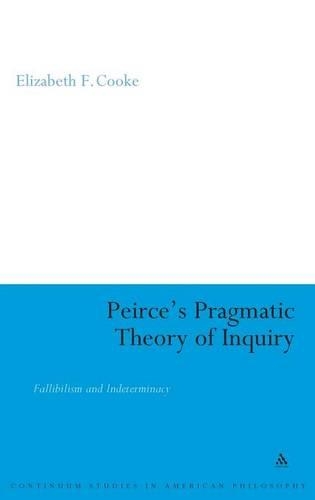
Peirce's Pragmatic Theory of Inquiry: Fallibilism and Indeterminacy
(Hardback)
Publishing Details
Peirce's Pragmatic Theory of Inquiry: Fallibilism and Indeterminacy
By (Author) Elizabeth Cooke
Bloomsbury Publishing PLC
Continuum International Publishing Group Ltd.
6th November 2006
United Kingdom
Classifications
Professional and Scholarly
Non Fiction
121
Physical Properties
Hardback
192
Width 156mm, Height 234mm
430g
Description
The philosophy of Charles Sanders Peirce (1839-1914) is very important at every stage of the history of modern American thought. It informs William James's evolutionary metaphysics, John Dewey's theory of logic, W.V.O. Quine's naturalism, and Richard Rorty's notion of the Linguistic Turn. Similarly, many Continental philosophers, like Jrgen Habermas, Karl-Otto Apel, Jacques Derrida, and Umberto Eco, have developed Peirce's semiotic logic as central to their own philosophical views. Yet until now there has been a yawning gap in the literature on what is arguably the most essential idea in the entire Peircean corpus, namely his "fallibilism." The basic idea of fallibilism is that all knowledge claims, including those metaphysical, methodological, introspective, and even mathematical claims - all of these remain uncertain, provisional, merely fallible conjectures.
As Elizabeth Cooke explains in Peirce's Pragmatic Theory of Inquiry, one long-standing concern with the idea of fallibilism is that it might all too easily slide into "skepticism." And this would certainly undermine the overall project of making Peirce's fallibilism the linchpin for any realistic pragmatism. So, it is essential to show Peirce's philosophy does not require any claims to certitude, in order to keep his fallibilism from falling into skepticism or contextualism. Cooke's solution to this problem is to interpret Peirce as having reconceived knowledge - traditionally defined as "foundational" and even "static" - as a dynamic process of inquiry, one which evolves within a larger ontological process of evolution. Her book will be of great interest not only to Peirce and Pragmatism specialists but also to contemporary epistemologists more generally.
Reviews
-Mention. The Chronicle of Higher Education/ May 11, 2007
"Cooke's thin volume is (as far as I can tell) the first book-length study primarily focusing on fallibilism in Peirce's thought. The book is accessible for those beginning with Peirce...However, the book is not merely an introduction, as Cooke also sharply engages in debates over the meaning of fallibilism and its compatibility with other aspects of Peirce's philosophy...I warmly recommend Cooke's volumeespecially its final chapter on hopeto Peirce scholars and philosophers of science. It is a clearly written...study of a fundamental theme in Peirce and in pragmatists theory of inquiry generally." -Sami Pihlstrom, Philosophy in Review
'This book is certain to change the direction of Peirce studies, and perhaps of epistemology in general, toward the primacy of fallibilism in all forms of human knowledge.' Richard J. Blackwell, Professor Emeritus, St. Louis University * Blurb from reviewer *
Author Bio
Elizabeth Cooke teaches philosophy at Creighton University, Omaha, Nebraska, USA. She is the author of numerous articles in various philosophical journals.
